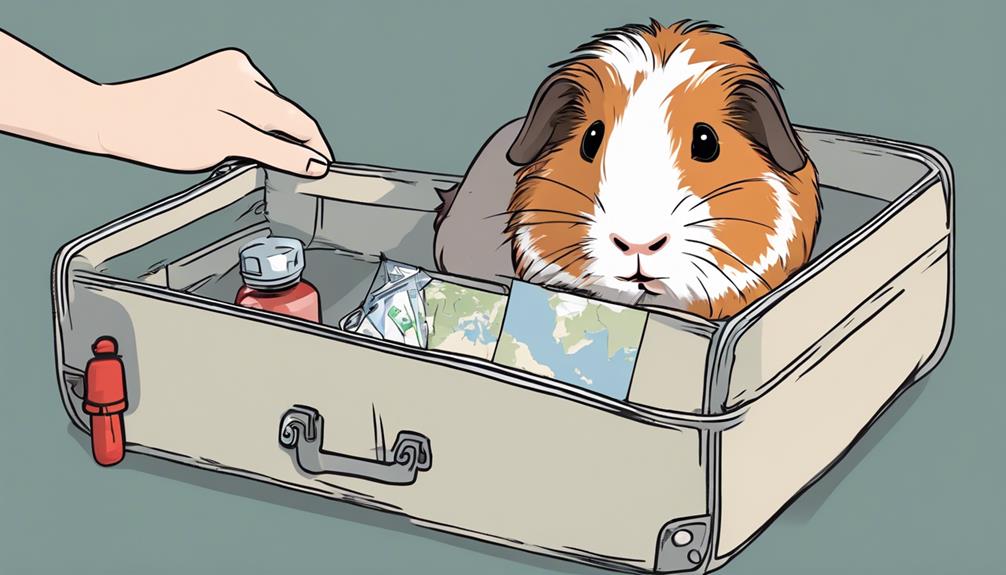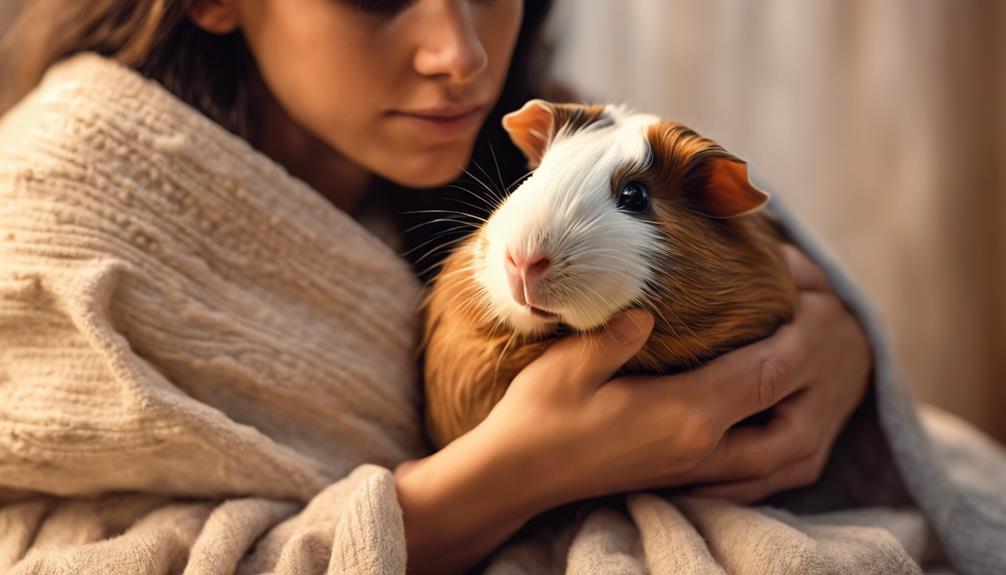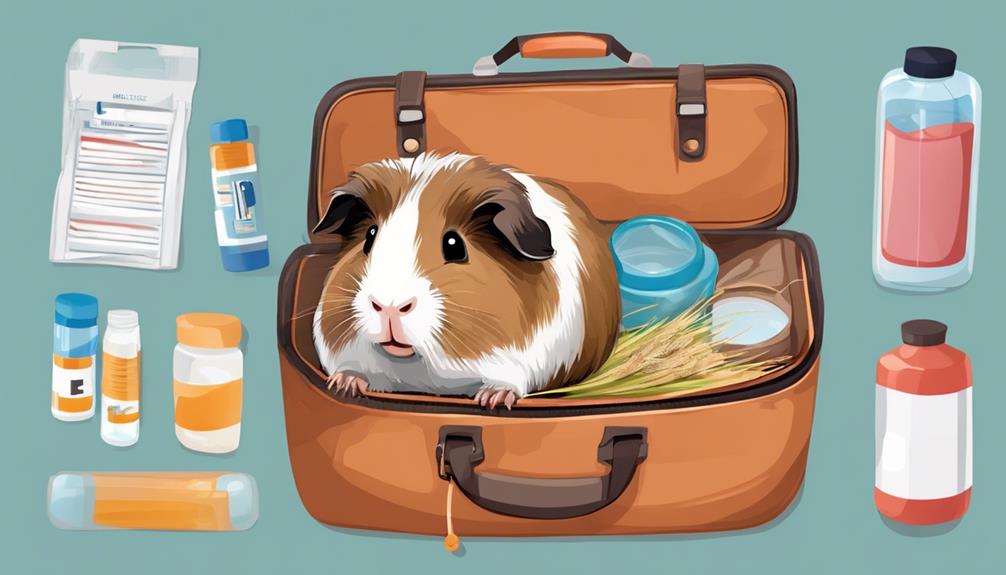What to Do If Your Guinea Pig Gets Sick While Traveling

Recognize signs of illness. Act quickly. Seek veterinary care to ensure your pet's well-being on the road.
If your guinea pig gets sick while traveling, it's crucial to be prepared. Keep a list of emergency veterinary clinics along your route. Pack a travel first aid kit with essentials like medication, syringes, and critical care food. Stay vigilant for any changes in behavior or appetite. Remember, early intervention can make a big difference in your pet's recovery.
Key Takeaways
- Monitor your guinea pig closely for signs of illness during travel.
- Have a vet contact ready and seek immediate assistance if your guinea pig shows symptoms.
- Keep food and water intake consistent to support your guinea pig's health on the road.
- Create a comfortable and stress-free environment in the travel carrier for your guinea pig's well-being.
Recognizing Signs of Illness
When traveling with your guinea pig, it's important to be able to recognize signs of illness promptly. Early intervention is key to guaranteeing your furry friend gets the proper care they need while on the road. Guinea pigs are known for hiding signs of illness, so it's vital to pay close attention to any changes in behavior or appearance.
One common sign of illness in guinea pigs is a decreased appetite. If your pet suddenly stops eating or drinking, it could be a red flag that something is wrong. Other symptoms to watch out for include lethargy, rapid weight loss, breathing difficulties, or discharge from the eyes or nose. If you notice any of these signs, it's crucial to seek veterinary care as soon as possible.
Proper care and attention to your guinea pig's health can make all the difference when traveling. By being vigilant and proactive in recognizing signs of illness, you can make sure your pet stays happy and healthy on your journey.
Monitoring Food and Water Intake
Keeping a close eye on your guinea pig's food and water intake is fundamental while traveling, especially given their tendency to hide signs of illness. Make sure the water bottle is securely attached to the cage to prevent spills and guarantee a fresh water supply. Check the water level regularly and refill as needed to keep your guinea pig hydrated throughout the journey.
Additionally, monitor the food bowl to ensure your furry friend is eating an adequate amount of food. If you notice a decrease in food consumption, it could be a sign of illness, and you should seek veterinary assistance promptly. Offering a variety of fresh veggies and hay can entice your guinea pig to eat while on the road.
Providing Comfort and Warmth

When a guinea pig falls ill while on the road, ensuring they're warm and comfortable becomes essential. Providing a heat source like a heating pad or a warm water bottle can help maintain their body temperature.
Additionally, using cozy bedding materials can create a snug environment for your furry friend to rest and recuperate.
Heat Source for Comfort
To guarantee your sick guinea pig stays cozy and comfortable while traveling, consider using a heat source to provide warmth. Portable heating solutions can be a lifesaver in such situations. Opt for a portable heating pad or a heat-emitting ceramic device that offers temperature control. These options are efficient and safe for providing the right amount of warmth to your furry friend.
When selecting a heat source, make sure it's suitable for small animals like guinea pigs and won't overheat or cause any harm. Proper temperature control is essential to prevent any accidents or discomfort. By incorporating a reliable heat source into your travel kit, you can make sure your guinea pig remains snug and content during the journey.
Cozy Bedding Materials
Consider opting for soft and insulating bedding materials to make sure your sick guinea pig stays comfortable and warm while traveling. Choosing the right bedding is important to provide a cozy environment for your furry friend. Here are some bedding options and materials to think about, keeping in mind allergies and ease of cleaning:
| Bedding Options | Bedding Materials |
|---|---|
| Fleece | Paper-based bedding |
| Hay | Aspen shavings |
| Pellets | Hemp bedding |
| Towels | Avoid cedar or pine shavings |
When selecting bedding materials, prioritize those that are gentle on your guinea pig's skin and respiratory system. Ensure the bedding is clean, dry, and changed regularly to maintain a hygienic environment for your pet.
Handling Stress and Anxiety
Feeling overwhelmed and anxious is common for guinea pigs during travels, requiring careful attention to their well-being. Stress management and anxiety relief are essential to guarantee your furry companion stays healthy and happy on the road.
To help alleviate their stress, create a familiar environment by bringing along their favorite toys, bedding, and food. Maintaining a consistent routine can also provide comfort and stability amidst the unfamiliarity of travel.
Additionally, make sure your guinea pig has a quiet and secure space within their travel carrier to retreat to when feeling overwhelmed. Covering the carrier with a light cloth can help reduce visual stimuli and create a sense of security. Calming aids such as pheromone sprays or soothing music can further assist in easing their anxiety.
Regularly checking on your guinea pig, offering them treats, and engaging in gentle interaction can help reassure them during the journey. By prioritizing stress management and anxiety relief, you can help your guinea pig feel safe and content while traveling.
Administering Medication Safely

When it comes to administering medication safely to a sick guinea pig while traveling, it's important to follow the dosage instructions provided by the veterinarian.
Monitoring the guinea pig's response to the medication is vital to make sure it's working effectively.
Proper storage of the medication is also necessary to maintain its potency and safety for your pet.
Medication Dosage Instructions
Administer the correct medication dosage to your guinea pig following the veterinarian's instructions precisely to guarantee their safe and effective treatment. Proper medication administration and accurate dosage calculations are essential in ensuring your pet's well-being. Below is a table outlining some general guidelines for administering medication to guinea pigs:
| Medication | Dosage Amount | Frequency |
|---|---|---|
| Medication A | 0.5 ml | Twice daily |
| Medication B | 10 mg | Once daily |
| Medication C | 1 tablet | Every 12 hours |
| Medication D | 0.2 ml | Three times a day |
| Medication E | 5 mg | Every morning |
Always consult your veterinarian before administering any medication and follow their instructions diligently to provide the best care for your furry friend.
Monitoring Guinea Pig's Response
After verifying the correct dosage of medication has been administered to your guinea pig, closely monitor their response to the treatment for any signs of improvement or adverse reactions. When traveling, guinea pigs may experience additional stress due to changes in their environment, which can impact their overall health. Keep an eye on your guinea pig's behavior, appetite, and energy levels. Confirm they're eating, drinking, and moving around as usual.
Additionally, monitor their temperature regulation by verifying they aren't too hot or too cold. If you notice any concerning changes or if your guinea pig's condition worsens, contact a veterinarian promptly. By attentively observing your guinea pig's response to medication, you can ensure they receive the necessary care during their illness.
Proper Storage of Medication
Proper storage of medication is essential to guarantee the safety and effectiveness of administering treatment to your guinea pig. When traveling with medication for your furry companion, it's important to follow these medication storage tips:
- Keep medications in their original packaging with clear labels.
- Store medications in a cool, dry place away from direct sunlight.
- Make sure medications are out of reach of children and pets.
- Check expiration dates regularly and dispose of any expired medications promptly.
Seeking Veterinary Care Immediately

Upon noticing any signs of illness in your guinea pig while traveling, promptly seek veterinary care to guarantee their well-being and address any health concerns. It is crucial to act swiftly when your furry friend is unwell, as their small size and susceptibility to health issues require immediate attention. Finding an emergency vet or urgent care facility can provide the necessary expertise to diagnose and treat your guinea pig promptly. Below is a table to help you understand the steps to take when seeking veterinary care for your guinea pig while on the road:
| Step | Action | Importance |
|---|---|---|
| 1. Research | Look up emergency vets or urgent care facilities in the area. | Vital |
| 2. Contact | Call ahead to ensure they can accommodate your guinea pig. | Critical |
| 3. Transportation | Safely transport your guinea pig to the veterinary facility. | Essential |
| 4. Medical History | Provide the vet with your guinea pig's medical history and symptoms. | Important |
| 5. Follow-Up | Follow any post-visit instructions diligently to aid in your guinea pig's recovery process. | Crucial |
Researching Local Veterinary Clinics
When exploring a new area with your guinea pig, it's crucial to research local veterinary clinics to guarantee prompt access to medical care if needed. Finding resources and locating clinics in advance can save valuable time and help your furry companion receive the care they require.
Here are some essential steps to take when researching local veterinary clinics:
- Ask for Recommendations: Inquire with locals, pet stores, or hotels for recommendations on reputable veterinary clinics in the area.
- Check Online Reviews: Utilize online platforms to read reviews from other pet owners about their experiences with different clinics.
- Verify Operating Hours: Make sure that the clinic's operating hours align with your travel schedule to avoid any inconvenience in case of an emergency.
- Contact in Advance: It's a good practice to have contact information for a few clinics on hand, so you can quickly reach out if your guinea pig needs medical attention.
Preparing an Emergency Travel Kit

Before embarking on any journey with your guinea pig, making sure you have an emergency travel kit prepared is a proactive measure to address unforeseen health concerns. Being prepared can make a significant difference in how effectively you can respond to emergencies. Here are some essential items to include in your guinea pig's emergency travel kit:
| Emergency Travel Kit | Purpose | Quick Remedies |
|---|---|---|
| Portable Carrier | Provides a safe space for transport and containment | – Keep your guinea pig secure during emergencies |
| Water Bottle | Ensures access to clean water for hydration | – Prevent dehydration in stressful situations |
| Hay | Offers familiar food for comfort and sustenance | – Maintain normal eating habits for gut health |
| First Aid Kit | Contains supplies for basic wound care and treatment | – Address minor injuries promptly for faster healing |
Having these items readily available can help you handle unexpected situations with ease and ensure your guinea pig's well-being. Being equipped with the right tools for emergency response can give you peace of mind while traveling with your furry companion.
Frequently Asked Questions
How Can I Prevent My Guinea Pig From Getting Sick While Traveling in the First Place?
To keep a guinea pig healthy while traveling, one should focus on diet management and exercise routine. Providing a balanced diet, fresh water, and opportunities for movement can help prevent sickness and guarantee a happy trip.
Are There Any Specific Travel Tips for Guinea Pigs to Minimize Stress and Sickness?
When traveling with guinea pigs, stress management is essential. Providing comfort items like familiar bedding can help ease anxiety. Choose a suitable travel carrier with proper ventilation and temperature control. These steps can minimize stress and sickness.
What Should I Do if My Guinea Pig's Symptoms Worsen Despite Providing Care?
If a guinea pig's symptoms worsen despite care, seeking immediate help is essential. Consider contacting an emergency vet for in-person assistance or opt for a remote consultation for guidance on providing the best care possible.
Can I Use Natural Remedies or Home Remedies to Help My Guinea Pig Feel Better While Traveling?
When traveling with a sick guinea pig, using herbal remedies, homeopathy, dietary supplements, or acupuncture can help alleviate symptoms. These natural approaches may offer relief and comfort to your pet while on the road.
How Can I Ensure My Guinea Pig Receives Proper Care if I Am Unable to Find a Local Veterinary Clinic While Traveling?
In moments of need, exploring emergency options becomes essential. For pet owners traveling with a guinea pig, seeking remote consultations with veterinary professionals can offer guidance and reassurance when a local clinic is out of reach.










